The oldest of all French breeds, the Dogue de Bordeaux, is an incredibly loyal and affectionate French mastiff. A large breed with expressive eyes and a furrowed brow, the Dogue de Bordeaux is a great family dog that is attentive to all ages.
Requiring a skilled handler, this dog is extremely powerful and can be put to work in many different capacities. Recognizable by its signature fawn colored coat and large head, this dog will be a protective and robust member of any family. Read on to learn more about the Dogue de Bordeaux.
Description of the Dogue de Bordeaux
The Dogue de Bordeaux (which we’ll refer to as the Bordeaux) is the picture of strength and power. From its undershot jaw reminiscent of a Bulldog, to its strong shoulders and low-to-the-ground profile, this breed can move very quickly when it wants to, and looks like it could take down almost anything in its path. But don’t let its size fool you! Underneath this breed’s soft coat and large muscles is an incredibly loyal, affectionate, and sweet-tempered dog.
These dogs have soft, short fur that hangs loosely around their bodies. Stocky and athletic, the Bordeaux looks intimidating. Its serious expression and stoic appearance give him the perfect look for a guard dog.
The Bordeaux is so old that its exact origin isn’t known, but the breed that exists today originated in France before it was even a country! This breed was originally used as a guard dog for aristocratic homes, but when the French Revolution happened in the late 1700s, and the noblemen were stripped of their lands, these dogs instead found employment hauling loads to market. They are nicknamed the “Butcher’s Dog” for this reason.
While the Bordeaux is usually solidly colored, from rich dark red fawn to light fawn, they can occasionally be found to have white spotting on their chest and low down on their legs.
Life Expectancy and Size
As is the case with many large breeds, the Dogue de Bordeaux has a much shorter lifespan than smaller dogs. Living an average of 5 – 8 years, they do have health problems that can shorten their lifespan. But with proper care many live long, full, and healthy lives.
Working with a reputable breeder who screens for genetic problems can help you be prepared for problems your dog may encounter.
The males stand 24 – 27 inches off the ground, and weigh at least 110 pounds. Females typically stand a bit shorter at 23 – 26 inches, and weigh at least 99 pounds. There is no official maximum weight for the Dogue de Bordeaux; it is more important for them to be proportionally balanced to their own body size.
Protective Ability
The Dogue de Bordeaux is an excellent choice for a guard dog. Vigilant and fearless without being aggressive, these dogs are mild-mannered around strangers when properly socialized. These dogs bond closely with their families, and are always keeping a watchful eye out.
They become more aloof and discriminating as they age, preferring to view from afar, and assess before entering situations. Their even-keeled and self-assured nature make them the perfect choice for those wanting a guard dog.
Training
The Dogue de Bordeaux is a kind and calm dog that requires a skilled trainer. These dogs respond well to praise, treats, and consistency. It is important to use this positive training to show your Bordeaux who holds the paycheck (treats), as they won’t respond to someone who is all bluster and no action. Rewarding your dog for good behavior, and preventing the bad is the way to go. Your Bordeaux will be eager and quick to learn.
As a strong guard dog, it is absolutely essential to properly socialize your Dogue de Bordeaux from a young age, so that he does not become shy or hostile. They are naturally protective, so by being socialized early they will be watchful but respond calmly to strangers.
Energy Level
These big dogs need lots of room to move around, and require moderate exercise. They love to relax and snuggle up with the family. They are quite adaptable to many situations, and can be very playful or very lazy. Be sure to give your Dogue de Bordeaux exercise everyday, though, so that he does not become obese, which puts extra strain on his body.
What Living with a Dogue de Bordeaux is Like
You will definitely notice your extra family member when he tries to jump up into your lap and lick your face with his huge tongue. This dog is known for lots of drooling, so be sure to keep some extra boxes of tissues around the house.
His great size just means that he has that much more love to give. The Dogue de Bordeaux requires a lot of social interaction with his family, or he can become shy and destructive. Always providing lots of time for play and affection will make sure your Bordeaux is happy.
These dogs love kids, and would do anything for their families. Known for their loyalty, you should expect that your Bordeaux will always be on the lookout for threats, but he will likely remain calm and levelheaded in almost all situations.
Unfortunately, these big dogs are prone to some health concerns, which may either shorten their lives or be expensive to manage.
Care of the Dogue de Bordeaux
The most important care the Dogue de Bordeaux needs is adequate family time. Affectionate and loyal, these dogs do not do well if left alone for too long.
Environmental Needs
The Dogue de Bordeaux does not have many environmental needs. They will do much better in a house with a large yard, as opposed to an apartment, as they are quite big and need lots of room to move around.
Their thin fur doesn’t protect them well from the cold, so try to limit outdoor time in cold climates. Neither do they fare well in extreme heat, so avoid lots of exercise and time outside when temperatures soar. The heat can be especially dangerous, thanks to this breed’s short snout, which limits his ability to cool off by panting.
Exercise Needs
These dogs require moderate exercise when they are fully grown, but as puppies it is best to limit their exercise to no more than ten minutes at a time, and keep any type of high impact movement to an absolute minimum.
These dogs are prone to orthopedic issues, and so helping their joints form properly when they are puppies will keep these issues to a minimum later in life. Even full-grown dogs shouldn’t be jumping higher than the height of their backs.
Taking your Dogue de Bordeaux on daily walks, and allowing backyard playtime, should be more than enough to satisfy his daily exercise needs. This is a strong breed with lots of endurance, so long days of less strenuous exercise are good.
Shedding and Grooming
The Dogue de Bordeaux has a short, fine, and silky coat that does shed and will need weekly brushing to keep it healthy, and control hair around the house.
Because of the folds on their faces it is important to check weekly – or even daily – to make sure they are dry and clean, and that infections are not forming. Also check the ears weekly to make sure they are clean and healthy.
This breed only needs bathing about every month or so, and have their nails trimmed monthly to avoid ingrown toenails that cause infections.
Ideal Home Environment
These dogs do best in a home that can provide lots of love, affection, and company. They love to be a part of the family, and will jump right up into your lap if you let them. They make great guard dogs and, while quite mild mannered, will always keep their families safe.
Health Concerns
Orthopedic issues are one of the most common issues that plague these large dogs. Because of their size, all of their weight can put added stress on their shorter joints. Things like hip dysplasia are genetic and appear later in life, so by keeping your dog at a proper weight, giving him moderate exercise, and ensuring a healthy diet you are providing him with the best chance to avoid these types of health issues.
This breed is also very susceptible to gastric dilation volvulus, GRD, where air can become trapped in the stomach. Also called bloat, this condition is potentially life threatening but can be prevented by avoiding feeding your dog one large meal and keeping exercise to a minimum after eating.
Other issues include cancer, heart disease, epilepsy, skin infections, and ear infections.
Behavior Problems
This independent breed does best with short, game-like training sessions. If you teach this breed that you are the holder of treats, he’s happy to learn from you. If you’re not seeing the behaviors that you want and you’re tempted to correct him, take a step back and see if you can figure out why the situation is too hard for him. Make it easier and try again.
The Dogue de Bordeaux is very gentle and loving, but will become shy and/or aggressive if not properly socialized. Be sure to give your dog lots of exposure to people and other dogs from a very young age.
These dogs can also suffer from separation anxiety, and do not do well if left alone for long periods of time. Be sure you can devote lots of time and energy to your four-legged friend so he doesn’t engage in destructive behaviors.


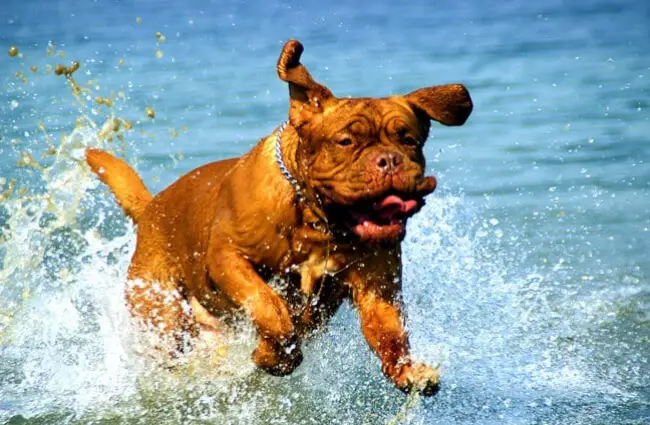
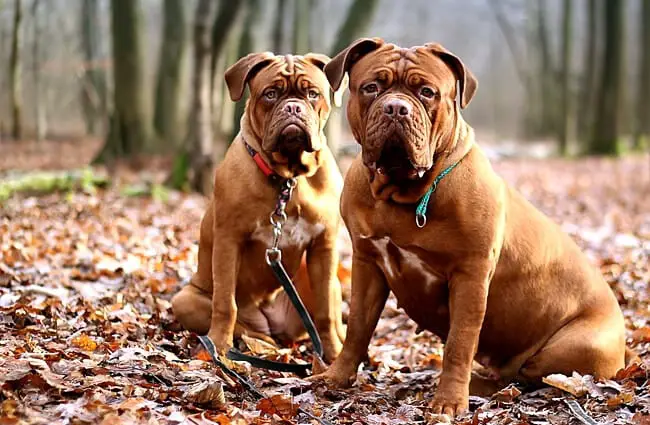

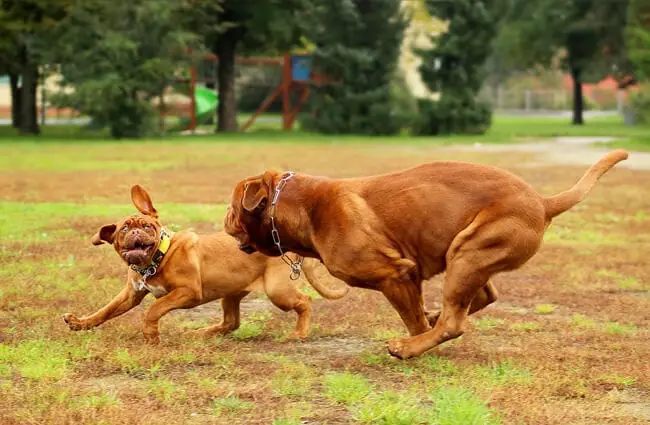








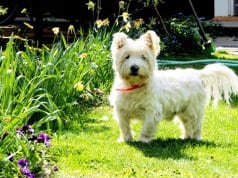



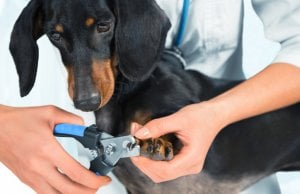


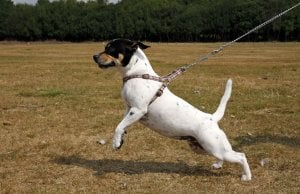
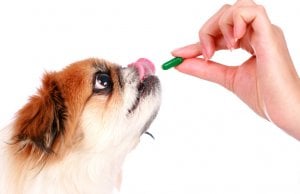
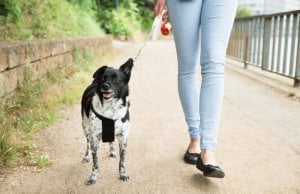


![Red Angus Closeup of a beautiful Red Angus cowPhoto by: U.S. Department of Agriculture [pubic domain]https://creativecommons.org/licenses/by/2.0/](https://animals.net/wp-content/uploads/2020/03/Red-Angus-4-100x75.jpg)

